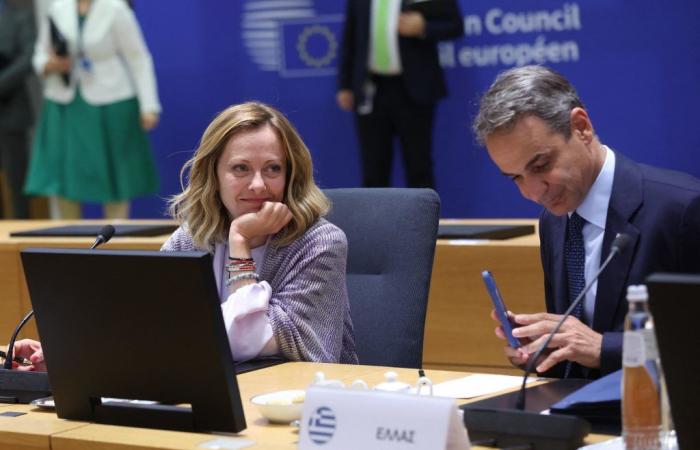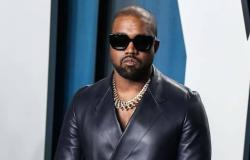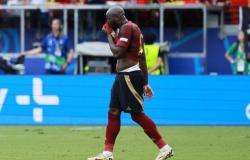Meloni at the European Council – Ansa
At the end of a long and nervous day, the package of appointments for the leaders of the European Union passes into the night but with Italian distinction. Green light therefore from the EU Council for the German popular Von der Leyen at the helm (for the second time) of the EU Commission, for the socialist Costa, Portuguese, who will lead the summits of the Twenty-seven and for the Estonian liberal Kallas, indicated as High Representative for foreign policy.
However, Giorgia Meloni, president of the European Conservatives (Ecr), distances herself from an agreement that sees the popular, socialist and liberal leaders as protagonists. The prime minister abstains on Von der Leyen, thus keeping her hands free to vote for her, possibly, in the session of the European Parliament in Strasbourg on 18 July. And she says “no” to both Costa and Kallas, in what was – it was one of the hypotheses of the eve – a split vote on the three different roles. The Italian prime minister surpasses Orban in radicalism: the Hungarian leader in fact votes against Von der Leyen, in favor of Costa and abstains on Kallas. The other conservative leader present among the Twenty-seven, the Czech Fiala, instead says “yes” to the package.
After the vote, Palazzo Chigi made it known that “in the framework of the votes in the European Council on the appointments of the new leaders, the Italian government reiterated its opposition to the method followed in the choice by the EPP, Socialists and Democrats and Renew negotiators, expressing vote against the candidates for President of the European Council, Antonio Costa and High Representative for Foreign Affairs and Security Policy, Kaja Kallas. As regards the nomination of Ursula von der Leyen as President of the European Commission, a vote of abstention in compliance with the different evaluations between the parties of the government majority, and while waiting to know the programmatic lines and open a negotiation on Italy’s role”. When he talks about different evaluations in the majority, Meloni refers to the fact that Forza Italia is part of the EPP and therefore “expresses” Von der Leyen, while Salvini’s League is part of the Identity and Democracy family, which does not want an encore of politics German. The note from Palazzo Chigi suggests that Italy’s real challenge now consists of the position as European commissioner which will be entrusted to Rome. While the vote of Fdi and the European Conservatives (but not all, the group seems to be in an internal crisis) will depend on the programmatic openings of Von der Leyen, who is moving towards an encore.
Shortly after the note from Palazzo Chigi, Meloni added on social X: “The proposal formulated by the Populars, Socialists and Liberals is wrong in its method and merit. I have decided not to support it out of respect for the citizens and the indications that came with the elections. We continue to work to finally give Italy the weight it deserves in Europe”.
Before returning to Rome the Prime Minister held a nocturnal press point, largely dedicated to the National Youth case. Meloni defended his choices in the EU Council adding that “it would be shameful if someone wanted to make us pay, but I exclude it”. “You think – said Meloni – that you have to get along to get out of isolation, I think that you are decidedly less isolated when you have the ability to exercise leadership. I believe that this is Italy’s role, and not to agree. So frankly when I agree I say it, when I don’t agree I say it.” As for Von der Leyen, the discussion is still open but “it depends on the policies”.
Almost at the same time, German Chancellor Scholz chilled her by rejoicing at the fact that “the populist right” is “out of the agreement”. On the contrary, Von der Leyen, speaking to the press, reiterated that for her “it is very important to work with Italy” and in the next few days she will speak “with the national delegations to the European Parliament”.
The prime minister’s day between Tajani’s side, Salvini speaking of a “coup d’état” and Schlein raising walls against her
At 8.15pm, when the dinner on the “top jobs”, on the top positions of the European Union, was about to begin, Giorgia Meloni’s staff let slip the only indiscretion of the day: «Our starting position is “no” or ‘abstention’ to the package agreed by the People’s Party, Socialists and Liberals. It was, in fact, the starting position of a summit dinner that lasted until late. There was the possibility that the EU Council would express a consensus on the package without resorting to a vote, but evidently the discontent of the right-wing leaders who were effectively excluded from the negotiations led, in the end, to counting.
The prime minister spent her day sitting at a crossroads. On her left, she found herself, perhaps belatedly, with an EPP generous with compliments, caresses and outstretched hands. Trying to redirect the course of events with several interventions was a prolific Antonio Tajani, supported by Manfred Weber, who intervened several times during the day to reiterate the same concept: “It was a mistake not to have spoken to Italy earlier”. Tajani indicates a path that then materializes in the interventions of the popular general staff, including those, like Tusk, who are less inclined to a close dialogue with the political area of the Italian prime minister. “The European Parliament – explains the Italian deputy prime minister – must be certain that Von der Leyen will pass by secret ballot: in 2019 Angela Merkel asked the Conservatives for her. I have invited everyone to be very cautious and very careful”.
Words to translate. According to Tajani, if the Socialists’ veto against the Conservatives prevailed, as reiterated by Elly Schlein yesterday in Brussels (“we have made a commitment to say ‘no’ to any type of alliance with the Ecr group led by Giorgia Meloni as well as with the ID group that includes Le Pen and Salvini, rather let it be extended to the Greens”, said the Democratic leader), not only would the Italian government risk being pushed into isolation, but VdL would be exposed to snipers and would contribute to the consolidation of the right, now divided, if one may say so, between hawks and doves.
Meloni remains silent obstinately and prudently. In the evening, when Charles Michel’s staff descends on the press room, he reassures the journalists of Meloni’s “very collaborative and constructive” approach. Scholz’s delegation also speaks of a climate that is “less hot than the one in Brussels”. But evidently they were impressions destined to clash with the facts.
On the other hand, the tone has already risen on Wednesday in the Chambers, with the Prime Minister being tough in claiming Italy’s role, also supported by the words of the Quirinal regarding the essential role of Rome in the EU balance.
Giorgia Meloni certainly couldn’t afford a full and sunny “yes” to the package of appointments. For two reasons. One internal and one external. The internal one has name and surname: Matteo Salvini. His statement at 7pm comes across Brussels as a warning to the Italian Prime Minister. «What is happening in these hours smacks of a coup d’état. Millions of Europeans voted and asked to change Europe from all points of view and instead what do they propose? The same faces: Ursula Von der Leyen at the Commission, a socialist at the European Council, someone indicated by Macron for foreign policy”, attacks the Northern League deputy prime minister.
The external factor instead has the name and surname of Mateusz Morawiecki: the Polish has threatened to make the Pis leave the Ecr group, to go and build a central-eastern team with a geographical characterization. If Meloni goes out on a limb within a “system” agreement, she risks losing her allies in Parliament.
The final choice (one abstention and two noes) still allows the prime minister to arrive in Strasbourg in mid-July without saying either yes or no to her friend Von der Leyen. It is there, in Strasbourg, that the prime minister will conduct a new negotiation. For the Italian government, the nomination of commissioner with a real portfolio is at stake. For the ECR piece that will follow, parliamentary positions are at stake that imply political recognition.
EU leaders’ moral suasion after the PM’s blows on Wednesday
There was an attempt to involve Giorgia Meloni until the very end, to avoid a break with a large founding country, the third economy of the Union. The European Council opened yesterday with an attempt, especially by the leaders involved in Tuesday’s pre-agreement, to contain the fury of the Italian Prime Minister. No one missed the very harsh speech in front of the Chambers in Rome, the day before yesterday. Even if in reality the strengthened qualified majority needed to confirm the nominations (20 member states and 72% of the population) was already certain even without Italy.
“It was never our intention to exclude or offend anyone,” explained Greek Prime Minister Kyriakos Mitsotakis, one of the negotiators for the People’s Party, “I personally have great respect for Prime Minister Meloni. I am sure that we will address these issues and concerns in the discussions” at the summit. “No one more than me,” said even more directly the Prime Minister of Poland, Donald Tusk, the other People’s Party negotiator, “respects Prime Minister Meloni and Italy. It’s a misunderstanding: sometimes specific political platforms are needed (i.e. the “Ursula majority” composed of the EPP, PSE and the liberals of Renew, ed.) to facilitate the process, the common position of the three largest groups serves to facilitate the process. The decision is up to the European Council. There is no Europe without Italy, there is no decision without Giorgia Meloni. For me it is obvious.” German Chancellor Olaf Scholz, one of the two negotiators for the Socialists (along with Spain’s Pedro Sánchez, absent due to a family bereavement and represented by the German leader himself), toned down the meaning of Tuesday’s pre-agreement. “Here in the European Council, 27 member states are deciding,” he said, “the pre-agreement of the three families “is just a position, we will discuss it carefully among all of us.” “We are going in the right direction,” said Croatian Prime Minister Andrej Plenkovic, a PPP party, “many of us are in contact with Meloni.” “We must ensure,” also warned outgoing Dutch Prime Minister Mark Rutte (a liberal negotiator), “that Italy also feels well represented in the new Commission and not only that.” “There are,” Belgian Prime Minister Alexander De Croo, also a liberal, commented more harshly, “three groups willing to work together. That’s how democracy works. Democracy doesn’t just mean blocking.”
During the evening the atmosphere seemed relatively relaxed, even if the question of appointments came last, during the night, during dinner. In the evening, various diplomats made it clear that a possible abstention from Meloni would be more than fine, but if a no were to arrive, “we’ll deal with it”. In short, last night, the climate seemed clear: we move forward, with or without Meloni, even if it would be better to be able to involve her, and last night the optimism of an agreement without a formal vote was growing. But it wasn’t like that, in the end there was a vote. Moreover, the usual Hungarian Prime Minister Viktor Orbán takes care of the rant. «European voters – he stated via X – have been deceived. The EPP has formed a coalition of lies with the left and the liberals. We do not support this shameful agreement! Slovakia also remained opposed yesterday.
For Von der Leyen, the game moves to the European Parliament, where she should be confirmed with a vote in the Strasbourg chamber on July 18. Uncertainty remains for the numerous, probable snipers. The Commission estimates that there are 40-50 “snipers” who, in the “Ursula majority” of the Populars, Socialists and Liberals of Renew, could vote against her. And 399, therefore only 38 votes of margin compared to the absolute majority of 361, are really too few. Von der Leyen will have to find external votes with backroom deals. Obviously, the 24 MEPs of Fdi would be a big help, the alternative is the 53 votes of the Greens, who have offered to join the coalition several times. A good portion of the Populars (starting with Forza Italia) however says no. A very narrow path for the German.






